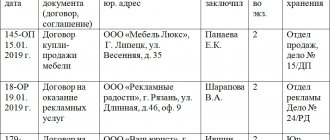Quite often there are situations when an agreement on the part of the counterparty is signed by a person on the basis of the charter or order of the counterparty. That is, the wording of the preamble of the agreement indicates the details of the internal order of your counterparty or a direct indication of the powers arising from the organization’s charter.
Moreover, the charter may indeed spell out the powers of the official. This person is given the authority to carry out certain transactions, but he is not an individual sole proprietor, information about which is included in the Unified State Register of Legal Entities.
And an internal order may indicate that the official is given the right to conclude certain transactions or that this is part of his official duties.
Each individual case entails a number of nuances when completing a transaction. This may not only be a signatory on the counterparty’s side; such representatives can also act on the company’s side.
Kinds
We classify on several grounds:
- by scope of powers: one-time, special, general or general, issued by way of delegation;
- by number of parties: unilateral and multilateral;
- by form: executed in simple written form and notarized;
- by term: unlimited and issued for a specific period.
The documents also differ depending on the principal. A power of attorney for signing an agreement is not distinguished as a separate type. But depending on the status of the principal, they are divided into those issued by organizations (this includes a power of attorney for the right to sign contracts from the organization) and those issued by individuals.
Recommendations from ConsultantPlus (free access)
Ready-made solution: What are the consequences of signing an agreement by an unauthorized person?
Signing a contract by an unauthorized person will lead to negative consequences
A situation may well arise that the represented party (your counterparty) will not fulfill its obligations under the contract. This may entail a claim against the represented (counterparty company) by your organization.
Legal relations arising from an agreement signed by an unauthorized person are regulated by Art. 183 Civil Code of the Russian Federation. An agreement concluded by an unauthorized person for the represented company (i.e., for your counterparty) is not concluded and does not have legal consequences.
As a rule, the issue of the invalidity of a transaction for the principal is usually resolved in a legal dispute regarding the failure to fulfill obligations under the contract. The court denies such a claim against the represented party, declaring the transaction invalid (clause 1 of the Information Letter of the Presidium of the Supreme Arbitration Court of the Russian Federation dated October 23, 2000 No. 57).
But there are cases when the represented company needs to defend its economic interests, and judicial invalidation of the contract is vital for it. This may be relevant when an important asset of the organization was sold by an unauthorized person.
In this case, it is possible to apply Art. 168 of the Civil Code of the Russian Federation, because Art. 174 of the Civil Code of the Russian Federation is used in the case of signing an agreement by a body of a legal entity. But in our case, the signatory is not a single legal entity and cannot be a body of a legal entity.
It turns out that the real transaction was made with a specific person who signed the agreement. Agree, such an individual who signed an agreement without authority cannot always actually fulfill the obligations under the agreement. A middle manager is not always able to pay the price of a major transaction or transfer property that does not belong to him.
When is it compiled?
Most often, the right to sign contracts and agreements, by virtue of their powers defined in the charter documents of the organization, is vested in only one person - the director or general director. But if he is overloaded with a large amount of work, he has the right to delegate some of his tasks to other persons. In this case, a separate written document is drawn up. It is recommended that the right to issue such powers be provided for in local regulations, and whether the employee has it is included in his job description.
For example, in management companies and housing associations they draw up a power of attorney to conclude contracts with resource supply organizations and issue it to the deputy director or lawyer, since they specialize in this type of activity and the volume of this work for such organizations is quite large.
The outcome of the trial depends on the company's awareness
Based on the above, the awareness of the second party about the lack of authority on the part of the signatory is of great importance in this situation. Therefore, if you find yourself in litigation, your organization needs to carefully consider how it can demonstrate a lack of knowledge of the signatory's authority.
Considering the wide possibilities for obtaining information contained in the Unified State Register of Legal Entities and constituent documents of legal entities, this task will be difficult to accomplish. The powers of a signatory without a power of attorney should always raise additional questions from the other party to the transaction. The powers based on the charter all the more require redoubled attention.
If the company manages to prove lack of knowledge, it will be able to recover damages from the signatory or require him to fulfill the transaction.
Only the question of the real capabilities of the signatory remains open. And if in a trial the court finds that the person who made the transaction with your organization does not have the proper legal capacity and (or) legal capacity, the transaction will be declared invalid, with all the consequences arising from the invalidity.
In conclusion, it should be said that modern dynamic working conditions do not always allow transactions to be concluded in compliance with all legal requirements. There is practically no time to check. But nevertheless, timely preventive measures taken to verify and properly formalize the powers of the signatory will protect your organization from such complex issues and problems that do not have clear judicial practice.
For what period are they issued?
Currently, the period is not limited by law, thus, a power of attorney for the right to conclude contracts from an organization is issued for any period. There are the following basic principles for determining deadlines (Article 186 of the Civil Code of the Russian Federation):
- if the period is not specified in the text, the document remains in force for a year from the date of issue;
- if the date of preparation is not indicated, the authorization is void;
- a notarized authorization without indicating a date remains in force until it is revoked.
What measures to take to prevent the deal from falling through?
Before signing the contract, you must verify the authority of the signatory by studying the constituent documents of the counterparty. If your concerns regarding the signatory's authority are confirmed, you must take the following actions:
- request from the counterparty a power of attorney for the signatory;
- obtain the necessary approval of the transaction from the CEO;
- record implied actions on the part of the counterparty in the form of prepayment, letters of guarantee, etc.
Such simple procedures will allow you to secure the validity of the completed transaction and protect you in case of further disputes.
After signing the contract, if you are unsure of the counterparty and his good faith, you have the right to unilaterally refuse the transaction (Article 183 of the Civil Code of the Russian Federation). To do this, you must send an application to the represented (counterparty company) or the person who completed the transaction.
You can refuse the transaction only if you did not know or could not know about the lack of authority of the signatory. That is, if you learned about the signatory’s lack of authority after the transaction was completed and are sure that problems cannot be avoided, it is better to refuse the transaction. It is better to send an application for refusal of a transaction to two addresses at once: to the counterparty to the transaction and to the person who signed the agreement.
Also, the transaction will be considered completed between your organization and the represented (counterparty company) from the date of signing the agreement if your company receives approval from the represented.
According to the Information Letter of the Presidium of the Supreme Arbitration Court of the Russian Federation dated October 23, 2000 No. 57, the following can be recognized as approval:
- written or oral approval, regardless of to whom it is addressed;
- recognition of the counterparty's claims by the represented party;
- specific actions regarding the transaction (payment, acceptance of goods, payment of interest, penalties, exercise of rights under the transaction);
- concluding a transaction to secure or change the first;
- request for a delay or installment plan;
- acceptance of collection order.
If the counterparty refuses to approve or does not approve the transaction within a reasonable time, the company has the right to demand that the person who completed the transaction fulfill his obligations under the contract. The company also has the right to unilaterally refuse the transaction and demand compensation for losses from this person. Losses are not subject to compensation if, when making a transaction, the other party knew or should have known about the lack of authority or about its excess (clause 3 of Article 183 of the Civil Code of the Russian Federation).
Registration procedure
When registering, adhere to the following rules:
- registration on the form is carried out at the request of the parties;
- a power of attorney from the organization to conclude contracts must be signed by the head or the person performing his duties on the basis of an order;
- Stamping on the document is not mandatory due to Part 4 of Art. 185.1 of the Civil Code of the Russian Federation, unless otherwise specified in the accounting policies or charter;
- it is mandatory to indicate what specific actions a person is allowed to perform on behalf of the organization;
- it is necessary to specify specific powers if this is specified separately in the law.
Requisites:
- name, details in full;
- name of the document, number and date of preparation;
- company name, last name, first name and patronymic, position of manager;
- an indication of the transfer of part of the powers;
- last name, first name and patronymic of the citizen, his position;
- indication of specific powers, duration, type of contracts;
- an indication of the certification of the citizen’s signature by the director;
- signature example;
- signature of the manager, seal optional.
The order is not a power of attorney
The law does not provide for the presence of an order in the list of documents on the basis of which an authorized person can carry out transactions on behalf of a legal entity.
When legal disputes arise regarding the powers of the persons who made the transaction, lawyers often try to qualify the internal order of the counterparty as a power of attorney. For a more detailed understanding of the significant difference in the legal nature of the internal order of the counterparty and the power of attorney, it is necessary to conduct a comparative analysis (see table).
Sample
Typically, a power of attorney from a director for the right to sign contracts is drawn up as follows.
| LLC "Storm" TIN 45000007777, checkpoint 450101101 Address: Kurgan, st. Krasina, 555, office 5. account 40702810888333300007 in the Central OSB 8599/09333 Sberbank of Russia, Kurgan c/s 30101810900000000999, BIC 04577554, OKPO 098778888 03/12/2020 POWER OF ATTORNEY No. 1/OP for the right to conclude contracts With this power of attorney, Storm LLC, represented by director Bender Ostap Iskanderovich, acting on the basis of the Charter, trusts the citizen of the Russian Federation Alexander Borisovich Schmidt, residing at the address: Kurgan, st. Lenina, 1a passport of a citizen of the Russian Federation 37 10 No. 222333, issued by the Federal Migration Service of the Russian Federation for the Kurgan region in the city of Kurgan on November 11, 2011, division code 450-002, perform the following actions on behalf of Storm LLC: conclude contracts for the supply of equipment for Storm LLC. Issued for a period of 1 (one) year. Sample signature of Schmidt Alexander Borisovich Schmidt I certify | Bender O.I. |
On behalf of an individual
If the principal is an individual, then he has the legal right to give another person the authority to certify business transactions with third parties. He also has the ability to make changes to existing agreements. Powers of attorney can be one-time or multiple. In the first case, information about the product, services, mandatory details, and information about the counterparty is indicated. A reusable document does not describe either the amount of the agreement or the subject of the agreement. It gives authority to an outsider who will sign on business contracts.
Important! If the power of attorney form was filled out in violation of Federal law, it may be declared invalid in court. Also, corrections, blots, and errors should not be allowed. The form can only be completed by authorized persons.
A power of attorney is drawn up in writing, in accordance with certain legislative norms. The following details must be entered into it:
- Place of compilation, date. You must write in legible handwriting so that all letters and numbers can be read.
- Full name, address, personal, passport details of both parties, contact information.
- If powers will be vested in a business entity, then the name, all codes, TIN, passport and personal data are written down in detail. All powers and validity period must be indicated.
After reflecting all the details of both parties, in the middle of the sheet you need to write the word power of attorney, indicate its number and date. On the next line, in the center, the name of the document is indicated. Next, you need to move on to the essence of the issue; you can describe the powers of the attorney point by point. After entering all the information, the document is submitted to a notary for certification. He will carefully check all the information and then make an entry in the unified register. For such a service you will have to pay according to the current tariff in the region.
Note! At the time of concluding the agreement, the authorized representative must present to all participants in the negotiations a power of attorney and a passport for personal identification. If there are no objections, appropriate entries must be made in the contract.
Example No. 1
Example No. 2
For what period are they issued?
When drawing up a power of attorney, the parties must indicate its validity period, and the exact date of execution. The validity period of the document is also stated. If this data is missing, the power of attorney will be invalid.
Is it necessary to notarize?
Powers of attorney for signing agreements do not require mandatory notarization. The exception is situations in which citizens draw up these documents in the order of delegation. This requirement is specified in Art. 187 clause 3 of the Civil Code of the Russian Federation. At the same time, Federal legislation does not prohibit individuals and business entities from certifying such forms.
Is it true that if I have a representative, I will not be able to participate in the process myself?
No, that's not true. The right to participate in the process - including independent participation - is one of the fundamental components of the right to judicial protection guaranteed by the constitution. Therefore, the choice “here and now” by a participant in the process of the option of participating in the meeting through a representative cannot limit this right. Anything else would be contrary to the Constitution of the Russian Federation.
The institution of representation allows a participant in the process to both participate in it personally together with a representative, and to completely shift the conduct of the case onto the shoulders of the representative. In this case, the principal himself can simply be present in the process as a listener, and act along with the representative or even instead of him, if the position expressed by the person involved seems incorrect to the client.
What conditions must be included in a contract of representation in court?
The specific requirements depend on which contractual model you choose. At the same time, from the point of view of the possibility of compensation for legal expenses for the services of a lawyer, it is necessary to provide in the contract conditions that very clearly describe the obligations of the representative (drafting documents, attending court hearings, familiarizing with the case), their cost, as well as the connection of this contract with a specific trial . In practice, the last condition may be included in the contract as follows:
- preparation and filing of a statement of claim for the collection of debt from Zlodey LLC under the supply agreement dated July 31, 2019 No. 8 in the amount of 5,000,000 rubles”;
- representation of interests in the arbitration court in case No. A41-4578/19.”
Who can act as a client and representative?
Formally, both citizens, organizations and individual entrepreneurs can enter into such agreements on both sides. In addition to the general requirements for legal capacity and legal capacity, the law does not provide for special requirements for representatives.
Therefore, it is possible to conclude an agreement to represent interests in court even between individuals. The only obstacle may be the fact that in this case the courts are a little less willing to compensate the costs incurred by the party at the expense of the opponent in case of victory and are often inclined to underestimate the reasonable amount of costs in comparison with cases where the agreement was concluded with a law firm.
Otherwise, all issues related to the representative’s illegal business activities are entirely his risk, and these circumstances cannot affect the amount of compensation for expenses.
At the same time, the complexity and often contradictory nature of current legal norms, as well as the unpredictability of judicial practice, require a high level of qualifications from participants in the process and persons representing their interests. This is a little less noticeable in courts of general jurisdiction - the process in them is by default unprofessional, and the “expectation bar” for judges is not so high.
The situation is different with arbitration litigation. The standard of awareness of those present in the process is much higher, and this entails a number of difficulties for participants representing their interests independently. For example, few people know that in an arbitration court, even silence and lack of objections to the other party’s arguments can mean their recognition.
All this allows us to conclude that as a representative it is worth choosing persons who not only formally have a higher legal education, but also show a decent level of theoretical training and have practical experience in handling cases in courts.
Features of drawing up an agreement based on a power of attorney: sample
When conducting a transaction through a proxy, a sample purchase and sale agreement by proxy from the seller or buyer is used to record the agreements. The main difference is in the indication of information about the participants along with a link to the transfer of authority to another person acting on behalf of the principal.
It is better to use a ready-made sample contract for sale by proxy, or entrust the drafting to an experienced lawyer. Mandatory details include:
- Name, date, place of execution of the document.
- Information about the participants and their representatives acting by proxy (full name, year of birth, address, parameters from the passport). In the paragraph describing the parties to the transaction, indicate the basis for the attorney’s actions - the number of the power of attorney and the place of execution).
- Information about the object (address, square footage, number of residential premises, floor, cadastral registration information).
- Data from documents confirming the right to dispose of and grounds for ownership of property (extracts from the Unified State Register of Real Estate, purchase and sale agreements, exchange, privatization, donation).
- Transaction amount (the price for which the parties agreed to re-register the property).
- Rights and responsibilities of each participant.
- Information about the presence or absence of encumbrances.
- Payment procedure (terms, currency, method).
- Information about registered and/or temporarily discharged persons (whether they exist or not, who must discharge all registered residents from the apartment and within what time frame).
- Additional information (about persons registered at the time of the transaction, outstanding debt, condition of the transferred object).
- Description of the procedure for transferring housing (timing, reference to the need to draw up an acceptance certificate).
- Dispute resolution and grounds for termination of the contract.
- Effective date.
- Signatures of the parties with transcripts.
In addition, the document contains data on the number of signed copies, 1 for each side and one additionally for registration in Rosreestr. When a party to a transaction is represented by several persons, a separate copy of the original is prepared for each.
Since one of the parties is absent, an authorized person is indicated at the place of signature.









